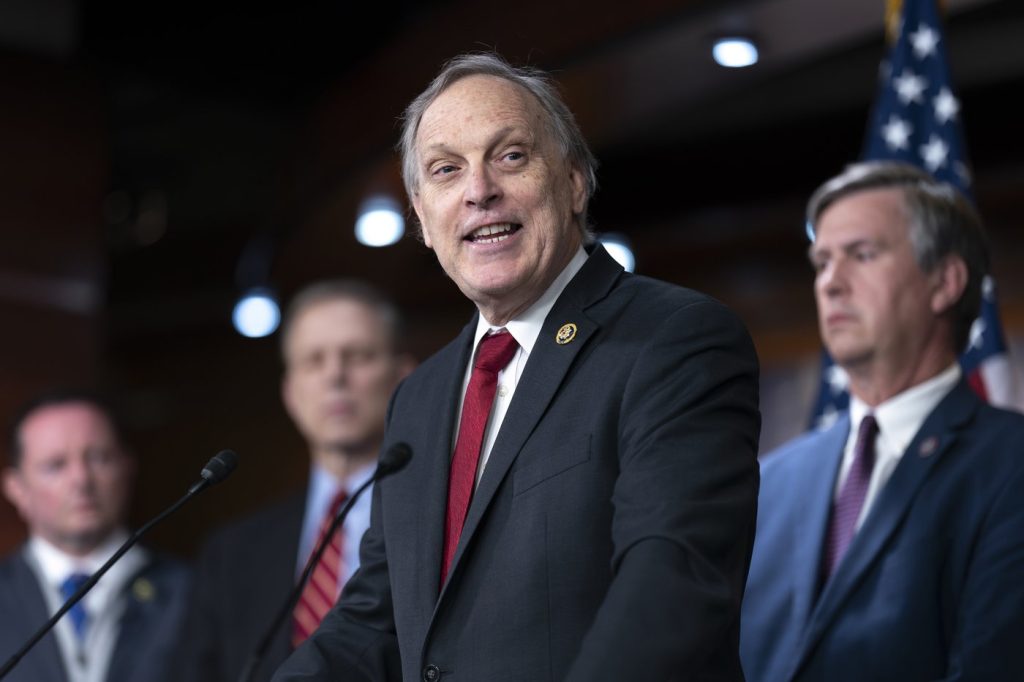PHOENIX (AP) – President Donald Trump has pledged to eliminate voting by mail, yet some of his Republican allies in Western battleground states are adopting a more cautious stance. U.S. Representative Andy Biggs, backed by Trump in Arizona's gubernatorial race, has not entirely ruled out mail voting, despite previous skepticism following Trump's defeat in the 2020 election. His primary challenger, Karrin Taylor Robson, also endorsed by Trump, has not clarified her position on mail voting.
This dilemma reflects a broader challenge for GOP candidates as they prepare for the midterm elections. They face the task of aligning their loyalty to Trump while addressing the desires of Republican voters who appreciate the convenience of mail voting. In Arizona, the issue is particularly contentious, given Trump's unusual decision to endorse both Biggs and Robson.
As the election cycle unfolds amid historically unfavorable conditions for the incumbent president's party, Trump's strong condemnation of mail voting raises concerns for Republicans in swing states. Strategic commentator Barrett Marson noted that mail voting contributed to Republican victories in Arizona during the 2024 election cycle, when Trump secured a win and the party expanded its legislative majority.
Trump's successful ballot-chasing initiatives resulted in approximately 51% of the 2,882,741 votes cast early in-person and by mail in Arizona. Republican Party Chair Gina Swoboda has also highlighted the role of early voting and ballot chasing in securing election results for Republicans. However, while mail voting remains favored by voters, Trump recently declared on Truth Social that he wishes to end the practice, except for individuals who are seriously ill or serving in the military.
Trump's long-standing doubts about mail voting have focused on unsubstantiated claims of fraud, despite evidence to the contrary. His inconsistent messaging in 2024 revealed a shift as Republicans began emphasizing early voting. White House spokeswoman Abigail Jackson stated that Trump's commitment revolves around restoring trust in the electoral process. In Arizona, where around 85% of voters utilize mail-in ballots, this issue carries significant weight.
Arizona Republicans were pioneers of mail voting in the 1990s but have experienced backlash stemming from election integrity conspiracies, exacerbated by voting count delays in Maricopa County. Trump's narrow loss to Joe Biden in 2020 by a mere 10,457 votes has fueled ongoing controversies. Maricopa County ranks as the nation's second-largest election jurisdiction, which complicates the timely counting of mail ballots.
As the political landscape evolves, Karrin Taylor Robson has shifted her rhetoric to appeal to traditional Republican values while trying to balance her alignment with Trump. In her campaign, she has emphasized Trump's endorsement and indicated agreement with him on key issues without overtly addressing her stance on mail voting. Biggs, while consistently supporting Trump, diverges in his views on mail voting, as confirmed by his campaign consultant Sean Noble, who stated that he does not advocate for its elimination.
In nearby Nevada, a similar dynamic unfolds for Governor Joe Lombardo. He has publicly endorsed Trump while attempting to craft a moderate identity amidst a competitive electoral environment. Lombardo has distanced himself from Trump’s claims about the 2020 election being stolen and has refrained from discussing mail voting specifics in his re-election campaign. Although he has called for common-sense election reforms such as voter ID, he faces the challenge of navigating opinions on mail ballots in a state where they play a significant role in elections.
Mail voting in Nevada has often surpassed in-person votes in recent elections, with a notable exception in 2024 when 45% utilized mail ballots. Lombardo previously suggested limiting mail ballot counting and has yet to clarify his current stance on Trump's call to eliminate the practice entirely.











